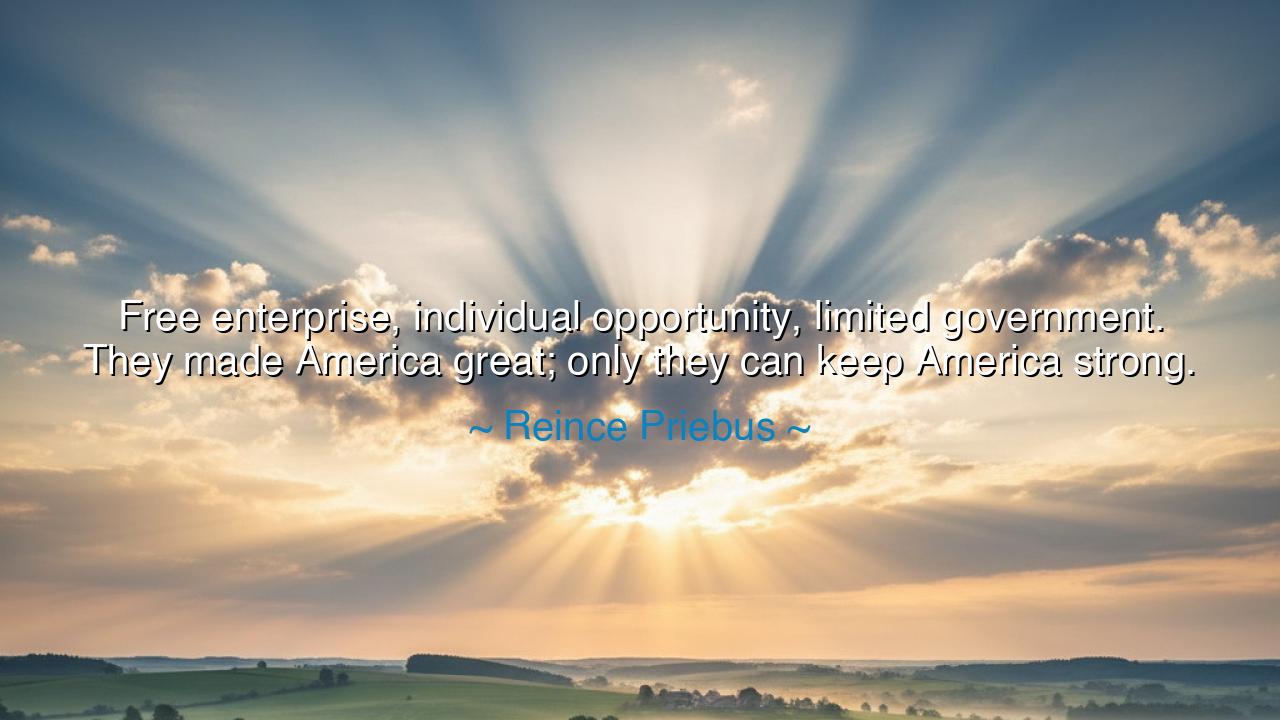
Free enterprise, individual opportunity, limited government. They
Free enterprise, individual opportunity, limited government. They made America great; only they can keep America strong.






The words of Reince Priebus, spoken with the clarity of conviction and the reverence of one mindful of heritage, are both declaration and warning: “Free enterprise, individual opportunity, limited government. They made America great; only they can keep America strong.” In this single sentence lies the essence of the American experiment—the triumvirate of liberty, responsibility, and restraint that forged a nation unlike any before it. Priebus calls not merely to the mind but to the heart of a people who risk forgetting that the power which builds greatness is the same power that must be guarded to sustain it. His words remind us that prosperity is not born from decree, nor strength from control, but from the sacred flame of freedom guided by virtue.
At its core, the quote speaks of balance—of the delicate harmony between freedom and order, ambition and accountability. Free enterprise is the economic reflection of liberty itself: the belief that individuals, given the chance to create, compete, and dream, will build wonders no government could design. It is the force that turns poverty into progress, ideas into industries, and effort into excellence. Yet, as Priebus warns, this system thrives only when paired with individual opportunity, the moral dimension of freedom—the chance for every citizen, regardless of birth, to rise by their merit and labor. And both, in turn, require limited government, for when the hand of the state grows too heavy, it crushes the very spirit it seeks to guide. The greatness of America, he reminds us, has never come from control, but from courage—from the faith that free men and women, left to pursue their destiny, will shape a better world.
The origin of these words lies in the long tradition of American political philosophy. As a statesman and former chairman of the Republican National Committee, Reince Priebus spoke these words to echo the principles that first ignited the Republic. He invoked the spirit of the Founders—the vision of Jefferson, who believed that government should be a servant, not a master; of Madison, who warned that men are not angels, and thus power must always be bound by law; and of Hamilton, who saw commerce not as greed but as genius unleashed. In the lineage of these men, Priebus reaffirms that the pillars of greatness are not new inventions of modern politics—they are the ancient virtues of self-reliance, liberty, and discipline, reborn on American soil.
History bears witness to the truth of his words. In the early days of the Republic, when the world doubted that a free people could govern themselves, America’s open markets and limited government unleashed a tide of innovation the world had never seen. The Industrial Revolution found its fiercest momentum in the United States, where inventors, entrepreneurs, and dreamers—unburdened by royal decrees or bureaucratic chains—transformed the raw wilderness into the engine of civilization. From Carnegie’s steel to Edison’s light, from Ford’s assembly line to the internet age, it was the union of free enterprise and individual opportunity that lifted millions from want. The lesson of this history is clear: every step forward for humanity begins when the individual is trusted to build, create, and dream.
Yet, Priebus’s words also carry the weight of warning. For every generation must confront the temptation to trade liberty for comfort, to believe that the government can provide what only the spirit of man can achieve. When bureaucracy replaces initiative, and entitlement replaces effort, nations decay from within. The Roman Republic once fell to empire not through invasion, but through the slow surrender of civic virtue. The people, weary of responsibility, welcomed rulers who promised order and ease—and in doing so, they lost the soul of their freedom. So too, Priebus cautions, must America beware: when citizens cease to guard the boundaries of government, they invite the very tyranny their ancestors fought to escape.
The deeper wisdom of this quote lies not in politics but in principle. For every human being, like every nation, faces the same eternal choice: to live by dependence or by dignity. Free enterprise is not merely an economic model—it is the manifestation of trust in human potential. Individual opportunity is not a slogan—it is the promise that effort, not privilege, determines destiny. And limited government is not neglect—it is respect, the acknowledgment that the highest form of governance is self-governance. These are not just systems of policy—they are systems of the soul. A people who forget them will not remain free for long, for liberty dies first in the heart before it vanishes from the land.
So let these words of Reince Priebus be carried as a torch into the generations to come: freedom must be guarded as fiercely as it is cherished. The task of preserving greatness lies not with politicians or parties, but with the daily choices of citizens—whether they choose independence over dependency, virtue over vanity, and discipline over ease. The lesson is clear and eternal: what made America great can still keep it strong, but only if her people remember that liberty is not a gift from government, but a duty before God.
Therefore, let each person live by these principles as if they were carved in stone. Work not because you are commanded, but because you are free. Dream not because you are permitted, but because you are able. And when the state grows vast and the spirit of man grows weary, recall the wisdom of the ancients and the courage of the founders: that freedom, enterprise, and opportunity, guarded by vigilance and virtue, remain the only true foundation upon which any nation—indeed, any soul—can endure in strength.






AAdministratorAdministrator
Welcome, honored guests. Please leave a comment, we will respond soon